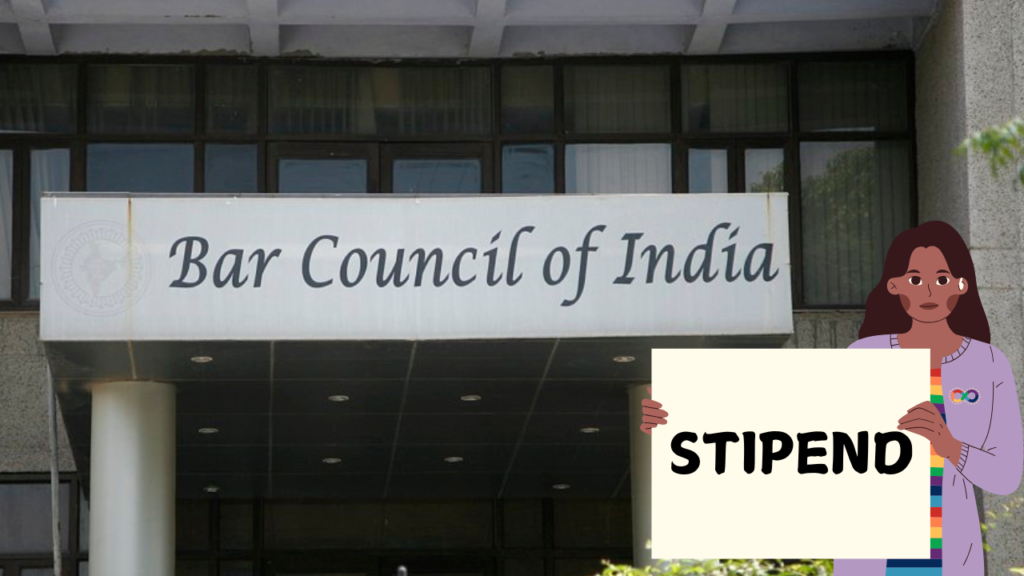Aastha Pareek
In a significant move aimed at supporting young professionals, the Bar Council of India (BCI) has recommended a monthly stipend of Rs. 20,000 for junior advocates practicing in urban areas and Rs. 15,000 for those in rural regions. This proposal, if implemented, could bring much-needed relief to new entrants in the legal field, who often face financial difficulties during the initial years of their careers.
The BCI’s recommendation comes in response to long-standing concerns about the financial challenges junior advocates face. Unlike other professions, fresh law graduates or young lawyers do not have the advantage of immediate, stable income streams. Their early years are typically marked by working under senior lawyers, where they often receive little to no remuneration. This lack of financial stability has been cited as a reason for many junior advocates leaving the profession or opting for corporate jobs instead of pursuing a career in litigation.
By addressing the financial vulnerability of junior advocates, the BCI aims to incentivize more young lawyers to remain in the practice of law, particularly in litigation, where the learning curve can be steep but crucial for developing effective advocacy skills.
According to the BCI’s draft proposal, the stipend will be directed at advocates who have completed their law degree but are yet to establish a sustainable practice. The eligibility criteria for the stipend are expected to include factors like the number of years in practice, as well as a clear distinction between urban and rural areas to account for the different cost-of-living standards.
Further details regarding the source of the funds and the disbursement mechanism remain to be finalized. One option under consideration is the creation of a welfare fund for advocates, supported by contributions from the legal fraternity, state bar councils, or even government aid. The BCI’s proposal emphasizes the need for coordination with state bar councils and possibly even state governments for smooth implementation.
The recommendation of a stipend reflects the BCI’s recognition of the financial inequities that junior advocates endure and their effect on the broader legal profession. The proposal is likely to impact two significant areas:
1. Retention in Litigation: Many junior advocates, particularly those from lower economic backgrounds, have been unable to sustain themselves during the initial years of their practice, leading them to seek alternate employment. This stipend may encourage young advocates to continue their practice without being pressured into leaving due to financial reasons.
2. Promotion of Rural Legal Practices: By offering stipends specifically for rural areas, the BCI may also be attempting to encourage more advocates to establish practices outside major urban centers, thereby addressing the shortage of legal professionals in these regions. The lower stipend in rural areas acknowledges the different cost of living, but also serves as an incentive for rural legal practice.
While the recommendation has been largely welcomed by the legal community, it also raises certain challenges. Foremost among them is the issue of funding. Implementing the stipend on a national scale will require substantial financial resources, and it remains unclear how the BCI plans to sustain the payment of stipends over time.
Additionally, there may be concerns about the uniformity of implementation across various states, especially given the disparate conditions of the bar councils across different regions. Rural advocates may also require additional support beyond the stipend, such as mentorship or infrastructure, to fully benefit from this initiative.
The BCI’s proposal of a monthly stipend for junior advocates represents an important step towards creating a more financially viable legal profession, especially for those just starting their careers. If successfully implemented, it could help alleviate the economic pressures on young advocates, thereby improving access to justice by ensuring a robust pool of talented litigators across the country.
However, the true test will lie in the implementation of this scheme, ensuring that the funds reach the intended beneficiaries in a timely manner and contribute to the long-term sustainability of the profession. As the legal community awaits further clarity, the proposal has sparked renewed hope for the younger generation of advocates struggling to find their footing in the profession.

